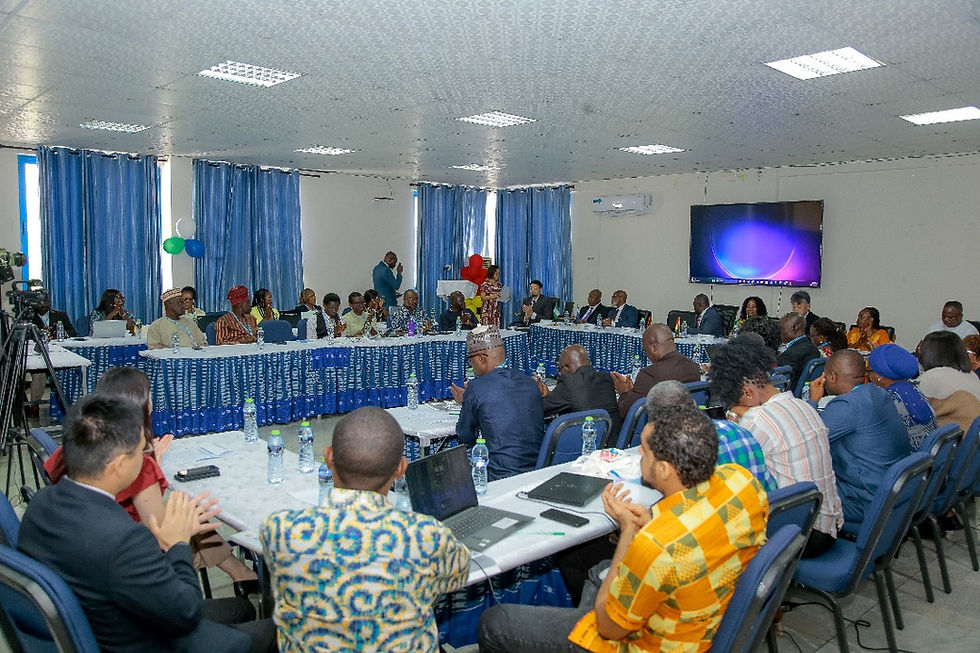"The unchecked influence of money on elections undermines integrity of our democratic institutions" - Mary Awelana Addah warns
- Think News Online
- Sep 12, 2024
- 3 min read

As Ghana approaches the 2024 general elections, concerns about the rising influence of money in politics have escalated, with election monitors warning that the high cost of running for office threatens the integrity of the country’s democracy.
In response, the Ghana Integrity Initiative (GII), in partnership with the Ghana Anti-Corruption Coalition (GACC) and the Ghana Centre for Democratic Development (CDD-Ghana), has launched an ambitious project aimed at addressing these critical issues.
The project, titled “Monitoring Campaign Spending, Abuse of Incumbency, and Vote Buying for Comprehensive Party and Campaign Financing Reform,” seeks to shine a light on the growing problem of financial dominance in Ghana’s political landscape.
The initiative aims to collect campaign finance data for the 2024 elections and provide evidence-based recommendations for reform, underscoring the urgent need for transparency and fairness in Ghana’s democratic process.
The Growing Influence of Money in Politics
The monetization of politics is not a new phenomenon, but its increasing scale is raising alarms.
According to a study conducted by CDD-Ghana, candidates must raise nearly GH₵390,000 (US$85,000) to compete in a parliamentary election.
The stakes are even higher for the presidency, with estimates reaching GHS 575 million.
Such figures highlight the financial barriers that exclude women, youth, and vulnerable groups from fully participating in Ghana’s democratic process.
Mrs. Mary Awelana Addah, Executive Director of GII, warned that these financial pressures threaten to distort the country’s democratic ideals.
"The unchecked influence of money on elections undermines the integrity of our democratic institutions," she stated, emphasizing that the political landscape is increasingly being shaped by financial power rather than public interest or policy-driven debate.
Gaps in Campaign Finance Regulations
Despite the legal framework established by the 1992 Constitution and the Political Parties Act, significant gaps remain in campaign finance regulations.
These gaps allow political parties to operate with limited transparency.
For instance, there are no caps on donations or expenditures, and disclosure laws remain weak, failing to require parties to identify their donors.
This lack of regulation has created a political arena where wealth can disproportionately influence outcomes.
Enforcement of existing laws also remains a challenge
While the Political Parties Act mandates parties to disclose their financial accounts post-elections, these regulations are seldom enforced.
As a result, political parties can navigate the electoral process without fully revealing the sources of their funding, raising concerns about accountability and the potential for corruption.
Abuse of Incumbency: A Persistent Challenge
One of the most pressing concerns raised by the GII-led initiative is the persistent abuse of state resources by incumbents.
This includes the use of government vehicles, state media, and public resources to support ruling parties during election campaigns, giving incumbents a significant advantage over their competitors.
Despite constitutional provisions like Article 55(11)(12), which mandates equal access to state media for all political parties, incumbents frequently misuse public assets to their advantage.
This practice undermines the fairness of elections and skews the playing field, compromising the democratic principle of equal opportunity for all candidates.
The Role of Civil Society and the Media
To address these issues, the GII Consortium’s project will closely monitor campaign spending and the abuse of state resources during the 2024 elections.
The goal is to provide empirical evidence to support advocacy efforts aimed at promoting comprehensive campaign finance reform.
Civil society and the media are expected to play a crucial role in this process.
By raising public awareness and holding political actors accountable, these groups can help ensure a more transparent and equitable electoral process.
"Our findings will inform advocacy efforts to promote reforms that ensure elections are won on the basis of ideas and policies, not financial muscle," Mrs. Addah explained.
A Critical Moment for Ghana’s Democracy
The stakes could not be higher, as the country prepares for the 2024 elections, the need for comprehensive reform in campaign finance has never been more urgent.
Without decisive action, the growing cost of politics could erode public trust in Ghana’s democratic institutions and further marginalize already vulnerable groups.
Frederick Adu Gyamfi, Director of Programs at CDD-Ghana, underscored the importance of addressing these issues.

He noted that while money plays a significant role in modern politics, unchecked financial influence could have devastating consequences for democratic governance.
"The integrity of our elections is paramount," he stated, urging all stakeholders—government, political parties, and civil society—to work together to safeguard the future of Ghana’s democracy.
In the coming months, the GII Consortium’s project will provide invaluable insights into the financial dynamics of Ghana’s elections.
Its findings could serve as a foundation for long-overdue reforms, helping to create a more transparent, accountable, and inclusive political system.
As Ghana gears up for the 2024 elections, this initiative represents a critical step in addressing the deep-rooted challenges of campaign finance and the abuse of incumbency, ultimately reinforcing the democratic values the country seeks to uphold.
Story by: Joshua Kwabena Smith








Comments